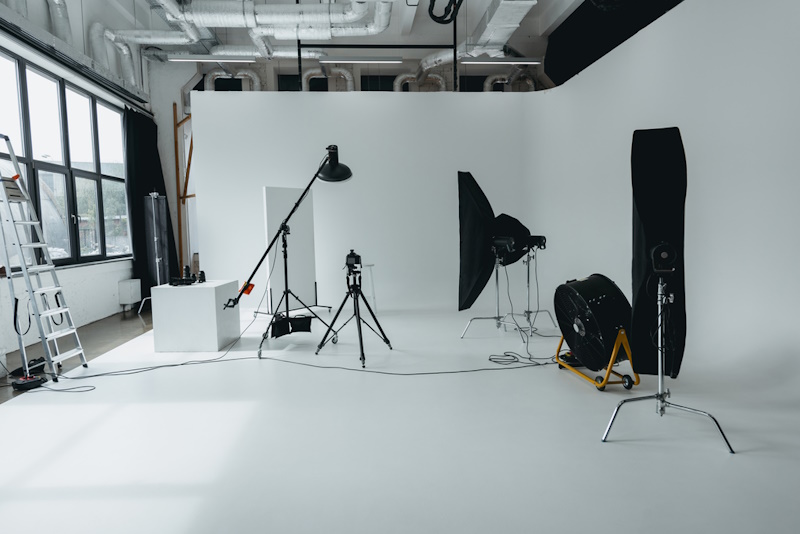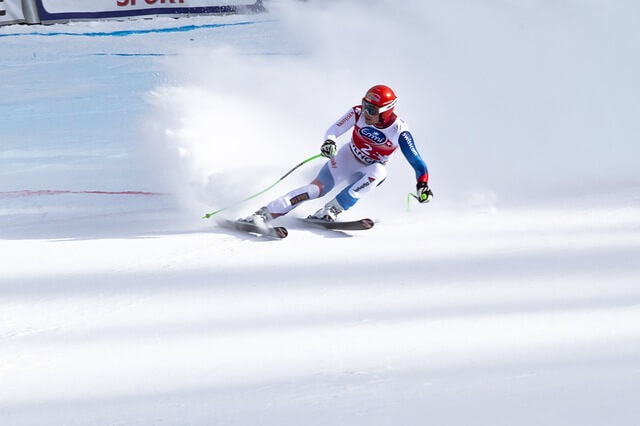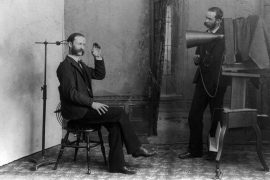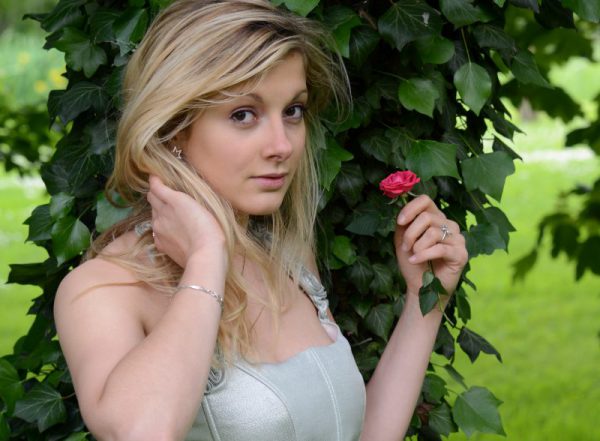Photography studios go beyond being places to take pictures. They are creative centers, havens where imagination flourishes, and enchantment is captured step by step. Creating these spaces is not just about looks; it is a skill that elevates the entire photography experience.
A well-designed photography studio is essential for exceptional photography. It’s not just about organizing equipment and props but creating an environment that inspires and enhances productivity. Picture entering a studio where creativity is present in every corner – a place where light dances perfectly and colors come to life. This is the power of a carefully planned studio design.
Creativity thrives in spaces that are designed to nurture it. The layout, lighting, and atmosphere of a studio can awaken the photographer’s muse. Imagine a layout where every corner has a purpose, where natural light streams in exactly where it’s needed, and where equipment is easily accessible. Such a setup becomes an extension of the photographer’s vision, a playground to explore and capture brilliance.
This article serves as your ultimate guide to creative photography studio design ideas. We will explore different arrangements to make the most of your space, lighting techniques to capture captivating portraits, and decorative suggestions to infuse your studio with character. Whether you’re an experienced photographer or a passionate beginner, these ideas will ignite your imagination and turn your studio into a sanctuary of inspiration.
We’ve created a video to complement this post, showcasing some of the best creative photography studio design ideas. Whether you’re setting up a home studio or upgrading a professional space, the video highlights practical tips, innovative layouts, and design elements to help spark your creativity. Watch it here and take your studio design to the next level!
I- Essential Considerations for Your Studio Space
1- Assessing space requirements: size does matter
The size of your photography studio is important for its functionality and inspiration. Think about the activities you’ll be doing and the equipment you’ll use. A bigger space gives you more flexibility for different shooting areas and props. But even a smaller space can be great with smart organization and layout planning. Make sure your studio complements your workflow and prioritizes functionality. With the right design ideas, your studio can be a creative and productive space for every shot.
Having a spacious studio is highly beneficial in the realm of fashion photography. It is recommended to have a studio that measures at least 15′ x 30′ (4.5 x 9m) to conduct stunning photoshoots and accommodate additional equipment setup.

A standard ceiling height of 10′ or 12′ (3m x 3.5m) is ideal for capturing distance shots. Opting to rent a photoshoot studio with the desired dimensions not only grants access to necessary equipment but also offers ample space to experiment and enhance productivity.
2- The role of natural light versus artificial lighting
Studio lighting can be achieved through natural light or artificial lighting. Natural light provides a soft and authentic feel, but it can be unpredictable. On the other hand, artificial lighting allows for control and consistency, which is important for specific photo shoots. Combining both types of lighting can be transformative, as it allows for capturing different moods and styles.

Photo by Depositphotos
It is essential to consider your photography requirements and explore how these lighting sources can work together. The interaction between natural and artificial lighting is a crucial element in designing a photography studio, as it enables the creation of stunning visuals in various genres.
The artificial lighting system of a studio includes the following:
-
Key Lighting Tools:
Invest in versatile tools like strobes, continuous lights, or LED panels. Each serves different purposes, offering flexibility for diverse shoots.
- Softboxes and Umbrellas:
Softening harsh light and creating gentle shadows, these modifiers are fundamental for achieving flattering portraits and even product photography.
- Reflectors and Diffusers:
Reflectors bounce light, filling in shadows, while diffusers scatter and soften light, perfect for achieving a natural, soft glow.
-
Light Stands and Booms:
Sturdy stands and booms provide stability and flexibility in positioning lights for optimal results.
- Remote Triggers and Syncs:
Efficiently control and synchronize multiple lights wirelessly with remote triggers and sync systems.
- Continuous Lighting for Video:
For video shoots or continuous lighting needs, consider LED panels providing consistent illumination.
3- Soundproofing and acoustics: creating an ideal audio environment
In a photography studio, the importance of soundproofing and acoustics cannot be underestimated. It is not just about capturing great visuals, but also about ensuring that the audio quality matches the visual excellence.
Soundproofing helps to minimize outside noise interference, allowing for better focus during shoots. Acoustics control echoes and reverberations, guaranteeing clear audio for video content or podcasts.
To optimize your studio’s audio atmosphere, consider using acoustic panels, soundproofing materials, and strategic layout planning. A well-designed space will not only capture captivating visuals but also ensure that every sound is as clear and professional as your imagery.
4- Ventilation and temperature control for comfort
Proper ventilation and temperature control are essential in photography studio design. It is important to have fresh air circulation to prevent stuffiness during long shoots. Maintaining the right temperature is crucial for both the equipment and the comfort of everyone in the studio.
You can consider using HVAC systems or fans to regulate the temperature and create a pleasant atmosphere. A well-ventilated and temperature-controlled studio not only helps the equipment last longer but also provides a comfortable environment for creativity to thrive.
5- Privacy and security for studio and equipment
When designing a photography studio, it is important to consider privacy and security. By setting boundaries, you can create a safe space for your equipment and clients. Use lockable storage for valuable gear and confidential files. Consider using window treatments or blinds to maintain privacy during sessions.
Adding access controls and surveillance systems will provide an additional layer of security. Prioritizing privacy and security in your studio design not only protects your assets but also creates a professional and trustworthy environment for your clients and team.
II- Maximizing Flexibility: Dynamic Studio Layouts
1- The benefits of a flexible studio layout
A flexible studio design has many benefits. It can easily change to fit different photography needs and make the most of the space available. By using movable equipment and versatile setups, you can easily create different styles and themes.
This flexibility allows for more creativity and the ability to try out different angles and compositions. It also helps with workflow, making it easier to transition between setups. Having a flexible studio layout opens up endless possibilities for unique and exciting photography session
2- Modular furniture and equipment for adaptive use
Photography studio design ideas are revolutionized by modular furniture and equipment. These versatile pieces serve various functions, maximizing both space and practicality. By using modular furniture, you can easily rearrange layouts to meet different shooting needs. Similarly, modular equipment like adaptable lighting systems and adjustable backdrops facilitate smooth transitions between setups.
By investing in modular elements, you have the power to personalize your studio space, opening up a world of creative possibilities. These items are not just furniture or gear, but rather tools that allow you to shape your studio environment according to your artistic vision.
3- Incorporating rolling walls or curtains for changing backdrops

Photo by Depositphotos
Rolling walls and curtains are game-changers in photography studio design. They make it easy to switch backdrops, saving you time and space. Curtains add a touch of class and can be adapted to different themes or styles.
By incorporating these elements, you can create a variety of visual stories effortlessly. Rolling walls and curtains not only serve a purpose but also bring efficiency and liveliness to your photography space.
4- Designing for multiple photography styles: portrait, product, fashion
In photography studio design, it is important to be versatile to cater to different styles such as portrait, product, and fashion photography. To achieve this, create separate areas within the studio for each style and optimize the lighting and props accordingly.
For portrait photography, a well-lit area with simple backdrops is ideal.
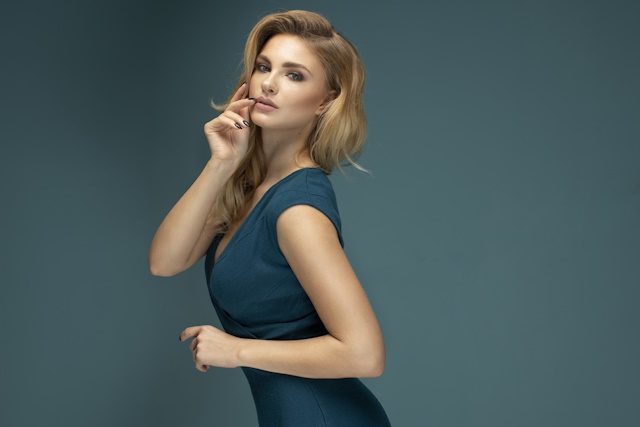
Photo by Depositphotos
Product photography may require dedicated spaces for tabletop setups and precise lighting control.

Photo by Depositphotos
Fashion shoots often require larger spaces with flexible backdrops and plenty of natural light. Incorporating movable elements like screens or backdrops allows for easy transitions between styles.

Photo by Depositphotos
Design your studio with adjustable lighting fixtures and storage solutions to accommodate various gear requirements. By creating a multi-functional space, you can seamlessly switch between different photography styles, maximizing creativity and efficiency in your studio.
III. Achieving the Right Aesthetic: Decor and Color Schemes
The ambiance of your photography studio goes beyond just lighting and equipment. It also includes the decor, which plays a crucial role in setting the mood and feel of your photos. Therefore, when designing your photography studio, it is important to consider the decor as an essential aspect.
Choosing the perfect color palette is similar to preparing the scene for your photo sessions. Think about shades that go well with different photography projects. Neutral colors such as white, gray, and beige offer flexibility and won’t take away attention from your subjects. Bright accent colors bring liveliness and can produce striking contrasts when used wisely.
-
Innovative wall and floor treatments for a signature look
Go beyond ordinary walls and floors. Try out different textures, patterns, or wallpapers to give your studio a distinctive style. Textured walls can bring depth and personality to your photos, while unique flooring choices such as wood, tiles, or polished concrete can add a special touch to your shoots.
-
Incorporating art and personal touches without clutter
Transform your studio into a unique space by adding personalized touches. Hang inspiring artwork or showcase your own photography to infuse personality. Just remember to maintain a sense of balance and avoid clutter. Place these elements strategically to enhance the ambiance without overwhelming the space.
-
Creating a unified look
Make sure your studio has a consistent decor style that complements various photography projects. Match your decor with your brand or preferred photography style. For example, if you focus on capturing dynamic and lively images, think about adding vibrant pops of color to your decor.
-
Achieving Harmony:
Decor should enhance, not dominate. The decor in your studio should work together with your subjects, directing the viewer’s attention to the main attraction: your photography. Find a balance where the decor enhances the environment without overshadowing it.
In the world of photography studio design ideas, decor plays a significant role. It creates the atmosphere, sets the tone, and adds to the overall beauty of your photographs. Explore, customize, and let your studio’s decor reflect your artistic vision, enhancing every image you capture.
IV- Creating a Client-Friendly Space
When setting up your photography studio, it is important to prioritize client comfort. By creating a welcoming environment that caters to their needs, you not only enhance their experience but also improve your professional image. Providing exceptional client service starts with crafting a client-friendly space.
1- Designing with clients’ comfort in mind
Think about how your client will experience the studio layout. Make sure they can easily move around different areas, with a strong emphasis on their comfort and convenience. An orderly space creates a good first impression and sets the stage for a successful session.
2- Creating a Waiting Area: What You Need to Know
Having a designated waiting area is crucial for a client-focused studio design. Make sure to provide comfortable seating, maybe some reading materials, and think about offering refreshments such as water or coffee. This space needs to create a warm and professional atmosphere, providing a relaxing environment before the shoot.
3- Incorporating amenities that impress and retain clients
Impress and keep your clients by offering impressive amenities. Make them happy with thoughtful conveniences like Wi-Fi access and charging stations for their gadgets. This will show them that you value and take care of them while they are in your studio.
4- Changing and makeup areas
To ensure clients’ privacy, it is important to design discreet changing and makeup areas. These spaces should be well-lit, have mirrors, and provide enough room for clients to comfortably prepare themselves. Privacy curtains or partitions can also help enhance their sense of ease.
5- Welcoming Waiting Areas:
Create a welcoming waiting area that is calming and inviting, helping to ease any nervousness before a shoot. Use gentle lighting, cozy seating, and add some thoughtful details to create a pleasant atmosphere.
6- Delightful Amenities:
Enhance the experience with thoughtful touches. Provide a variety of drinks and snacks, and add a special touch with personalized welcome signs or thank-you notes to show your attention to detail.
V- Editing and printing facilities
Adding editing and printing capabilities to your photography studio design enhances your workflow and customer services. These areas are crucial for post-production, where your photos evolve from mere captures to stunning masterpieces.
1- Editing Stations for Precision Work:
Create specialized workstations with powerful computers, editing software, and calibrated monitors for precise editing tasks. Make sure to provide enough room for comfortable editing sessions, enabling you to perfect every detail with accuracy. Invest in color calibration tools to ensure accuracy in your editing process. Consistency across screens and prints is vital for delivering the intended visual impact.
2- Efficient Printing Stations:
A printing space with top-notch printers guarantees excellent results. Choose adaptable printers that can handle different types and sizes of paper to meet the needs of different clients.
3- Showcasing Printed Work:
Create a dedicated space to exhibit printed photographs. This will not only showcase your abilities but also visually demonstrate your expertise.
4- Client Interaction and Approval Areas:
Establish areas where clients can comfortably review proofs or finalized prints. Engaging in face-to-face discussions and approving prints not only adds a personal touch to your service but also showcases your expertise visually.
5- Storage and Organization:
Keep your printing area neat and easy to access with effective storage solutions for papers, inks, and print samples. Systematically arrange these supplies to make it convenient to retrieve them while printing.
Conclusion
In the world of photography studio design ideas, the key lies in the small things. Every aspect, from the way you set up the lighting to the spaces for your clients, contributes to an environment where creativity can flourish. It’s not just about the equipment or the layout; it’s about creating an experience.
Your studio is more than just a place to take pictures—it’s a blank canvas waiting to be filled with innovation and creativity. The careful selection of decorations, the smart use of space, and the focus on making your clients comfortable all come together to create a space that inspires both you and your clients.
By embracing flexible layouts, incorporating versatile decorations, and making client comfort a priority, your photography studio becomes a sanctuary where beautiful moments are captured. As you continue to refine your studio, remember that every thoughtful detail adds depth to your work, shaping not only the physical space but also the stories it holds.
Related posts
How To Setup A Professional Photography Studio
Studio Strobe Lighting Kits: The Perfect Illumination
Portrait Studio Backdrops – Types And Recommendations
Photography Studio – Setting Up Home Photography Studio
Thanks for reading, I hope you enjoyed the article, if you have any questions just drop them below & I will be happy to answer you.
The featured Photo by Depositphotos
If you enjoy the site, don’t forget to subscribe, we will only inform you when a new article is posted.

